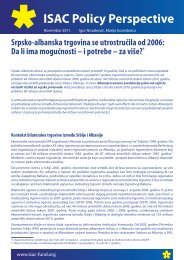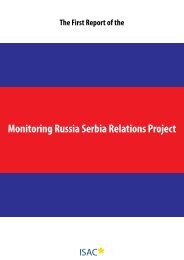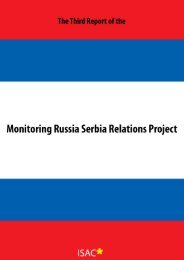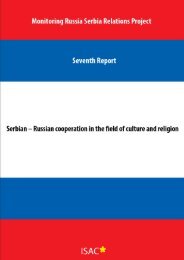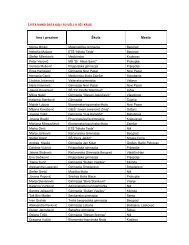the process of security sector reform - ISAC Fund
the process of security sector reform - ISAC Fund
the process of security sector reform - ISAC Fund
You also want an ePaper? Increase the reach of your titles
YUMPU automatically turns print PDFs into web optimized ePapers that Google loves.
George Katsirdakis SECURITY SECTOR REFORM FROM A NATO VIEWPOINT<br />
George Katsirdakis SECURITY SECTOR REFORM FROM A NATO VIEWPOINT<br />
Reserve Forces<br />
These forces, where <strong>the</strong>y exist, are meant to be forces which have been trained<br />
and prepared for action, although <strong>the</strong>y are not active forces. Their role, if <strong>the</strong>y<br />
are called up to action, is to augment <strong>the</strong> active forces in cases <strong>of</strong> emergency.<br />
Local Security Units<br />
These are forces for internal <strong>security</strong> such as <strong>the</strong> Home Guard, and are ei<strong>the</strong>r<br />
part <strong>of</strong> <strong>the</strong> Armed Forces, or special units, many times under <strong>the</strong> control <strong>of</strong> <strong>the</strong><br />
Ministry <strong>of</strong> Interior.<br />
CIVIL MANAGEMENT AND OVERSIGHT BODIES<br />
An indispensable requirement for <strong>the</strong> smooth functioning <strong>of</strong> <strong>the</strong> <strong>security</strong> <strong>sector</strong><br />
is <strong>the</strong> active presence, management and oversight <strong>of</strong> <strong>the</strong> various organisations<br />
authorised to use force. Without <strong>the</strong>ir active involvement <strong>the</strong>re is <strong>the</strong> danger<br />
that <strong>the</strong> <strong>sector</strong> could go out <strong>of</strong> control and could lead to totalitarian regimes<br />
and not to a democratic state. The system <strong>of</strong> checks and balances is a necessary<br />
characteristic <strong>of</strong> a democratic state.<br />
A very important role in this respect is played by <strong>the</strong> Office <strong>of</strong> <strong>the</strong> Head <strong>of</strong> State.<br />
In some countries <strong>the</strong> Head <strong>of</strong> State has increased responsibilities, and in a few,<br />
like in <strong>the</strong> United States, <strong>the</strong> Head <strong>of</strong> State is <strong>the</strong> actual Commander-in-Chief <strong>of</strong><br />
<strong>the</strong> Armed Forces. In o<strong>the</strong>r countries, <strong>the</strong> Head <strong>of</strong> State has a more ceremonial<br />
role and although <strong>the</strong> Head <strong>of</strong> State may still be <strong>the</strong> Commander-in-Chief, he<br />
or she does not exercise any real command. The actual command authority in<br />
<strong>the</strong>se cases is ei<strong>the</strong>r in <strong>the</strong> hands <strong>of</strong> <strong>the</strong> Government or directly in <strong>the</strong> hands <strong>of</strong><br />
<strong>the</strong> <strong>security</strong> <strong>sector</strong> organisations.<br />
In most democratic states, <strong>the</strong> democratically elected Government, from <strong>the</strong><br />
Prime Minister, to <strong>the</strong> related Ministers and <strong>the</strong> various Government advisory<br />
bodies, are heavily involved in <strong>the</strong> management and oversight <strong>of</strong> all <strong>the</strong><br />
various organisations <strong>of</strong> <strong>the</strong> <strong>security</strong> <strong>sector</strong> that are authorised to use force.<br />
The government bodies involved in <strong>the</strong>se functions normally are <strong>the</strong> Prime<br />
Minister’s Office, <strong>the</strong> National Security and Defence Advisory Bodies, <strong>the</strong><br />
National Security Councils, <strong>the</strong> Ministry <strong>of</strong> Defence, <strong>the</strong> Ministry <strong>of</strong> Interior,<br />
<strong>the</strong> Ministry <strong>of</strong> Public Order, <strong>the</strong> Ministry <strong>of</strong> Foreign Affairs, <strong>the</strong> Ministry <strong>of</strong><br />
National Economy, <strong>the</strong> Ministry <strong>of</strong> Finance, <strong>the</strong> Ministry <strong>of</strong> Justice, <strong>the</strong> Ministry<br />
<strong>of</strong> Transports and Communications and o<strong>the</strong>r government bodies, as <strong>the</strong> case<br />
may be for individual countries. All <strong>the</strong>se are considered bodies that have some<br />
direct or indirect role in <strong>the</strong> <strong>security</strong> <strong>sector</strong>.<br />
Ano<strong>the</strong>r important oversight component <strong>of</strong> <strong>the</strong> <strong>security</strong> <strong>sector</strong> is <strong>the</strong> Parliament<br />
which normally exercises oversight through passing legislation related to <strong>the</strong><br />
<strong>security</strong> <strong>sector</strong>, through special committees, special parliamentary hearings<br />
and debates, and through <strong>the</strong> <strong>process</strong> <strong>of</strong> approval <strong>of</strong> <strong>the</strong> budgets <strong>of</strong> <strong>the</strong> various<br />
organisations <strong>of</strong> <strong>the</strong> <strong>security</strong> <strong>sector</strong>. Extremely important in this respect is to have<br />
parliamentarians that have good knowledge and understanding <strong>of</strong> <strong>the</strong> structure,<br />
<strong>the</strong> functions and <strong>the</strong> requirements <strong>of</strong> <strong>the</strong> various actors <strong>of</strong> <strong>the</strong> <strong>security</strong> <strong>sector</strong>. It is<br />
also very important for <strong>the</strong> parliamentarians to have staffers who are well versed<br />
on <strong>security</strong>-<strong>sector</strong>-related issues and who can support <strong>the</strong> parliamentarians in<br />
<strong>the</strong>ir consideration <strong>of</strong> those issues.<br />
Finally, ano<strong>the</strong>r important oversight and management actor <strong>of</strong> <strong>the</strong> <strong>security</strong><br />
<strong>sector</strong> is <strong>the</strong> Judiciary authority. It is through <strong>the</strong>m that action can be taken to<br />
penalise <strong>security</strong> <strong>sector</strong> organisations which are not fully in line with <strong>the</strong> laws<br />
and regulations <strong>of</strong> <strong>the</strong> state. The presence <strong>of</strong> <strong>the</strong> Judiciary and <strong>the</strong> relentless<br />
insistence on respect <strong>of</strong> <strong>the</strong> state legislation acts as an important deterrent for<br />
those organisations <strong>of</strong> <strong>the</strong> <strong>security</strong> <strong>sector</strong> that may be considering taking action<br />
not totally compatible with <strong>the</strong> state legislation.<br />
CIVIL SOCIETY ACTORS<br />
In addition to <strong>the</strong> state-related actors already discussed, ano<strong>the</strong>r very important<br />
actor in <strong>the</strong> field <strong>of</strong> <strong>the</strong> <strong>security</strong> <strong>sector</strong> is <strong>the</strong> set <strong>of</strong> <strong>the</strong> civil society actors which<br />
in a democratic state has a key role in <strong>the</strong> context <strong>of</strong> questioning <strong>the</strong> way <strong>the</strong><br />
various state-related actors operate and on <strong>the</strong> way <strong>the</strong> tax-payers money is<br />
spent to maintain and run <strong>the</strong> various organisations <strong>of</strong> <strong>the</strong> <strong>security</strong> <strong>sector</strong>.<br />
This category usually includes bodies such as pr<strong>of</strong>essional organisations, nongovernmental<br />
organisations (NGO’s), advocacy organisations, <strong>the</strong> media,<br />
various religious organisations and various groups <strong>of</strong> concerned public.<br />
In a well governed democratic state <strong>the</strong> state-related actors should be open and<br />
transparent on <strong>the</strong>ir structure, missions, functions and budget utilisation without<br />
54 55








